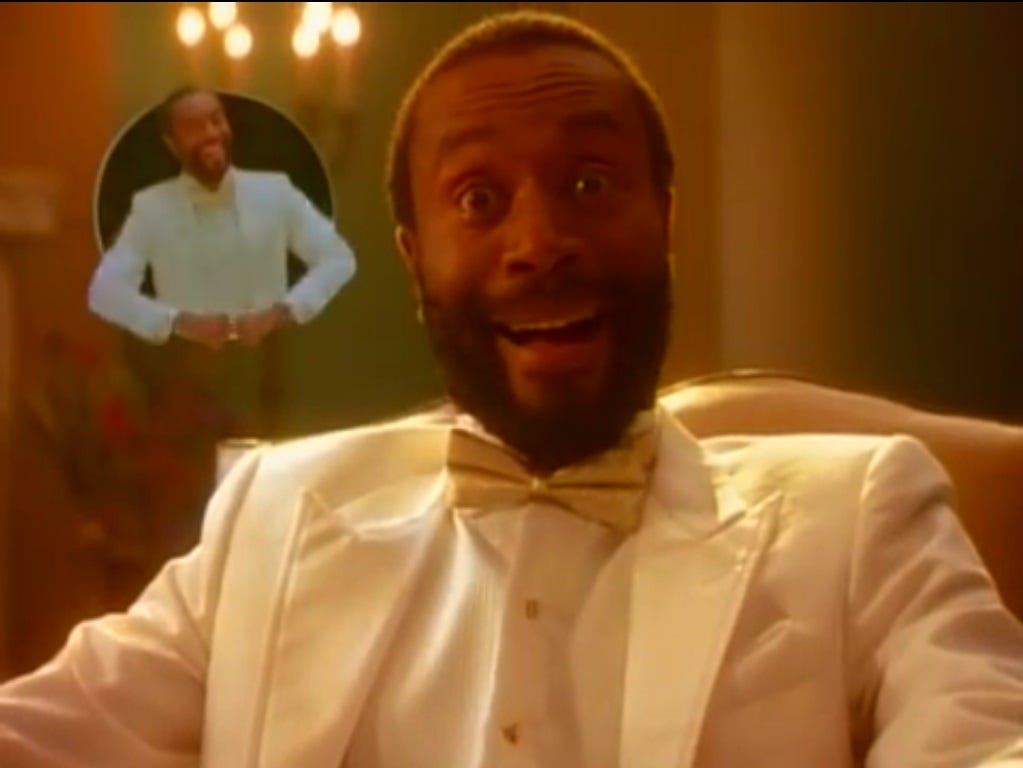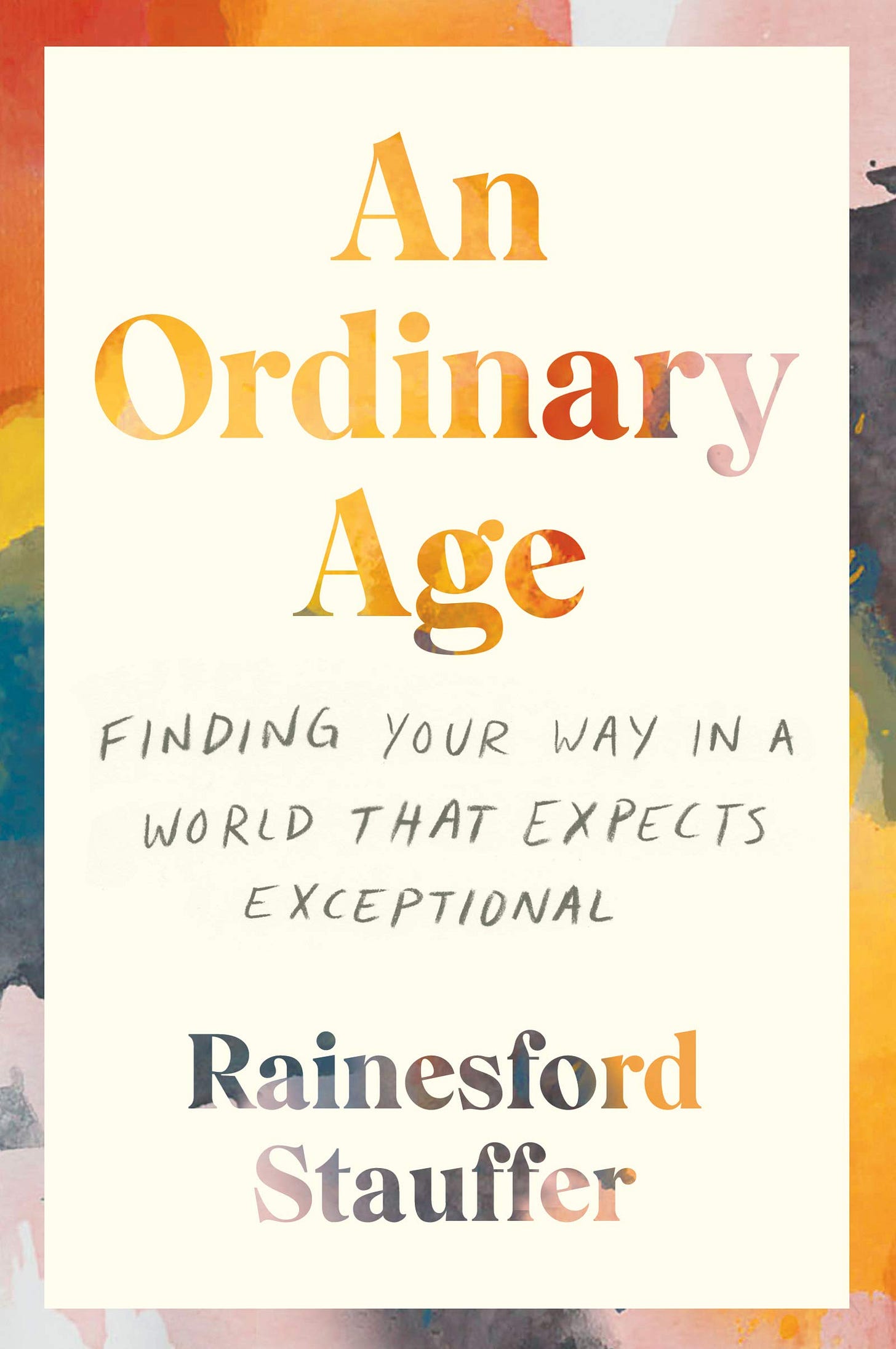In your life expect some trouble
Why you shouldn't worry and make it double

Meet my little Hummel friend Hans. Hans has sat on one shelf or another in my house ever since my mom gifted him to me to mark my engagement. My mom got caught up in the craze to collect these little porcelain figurines (collecting Hummels became quite a thing in the ‘60s and ‘70s), and she presumed once I had a house of my own, I’d develop a desire to assemble my own squad of Hummels just like she had.
Alas, Hans was destined to have only one other friend because I just wasn’t that into him. Nonetheless, Hans did come along when we moved into our first house. As young newlyweds starting a household from scratch, we didn’t have a lot of knickknacks–let alone furniture–so Hans earned a spot in our living room.
Through no fault of his own, in 1991, Hans ended up being collaterally damaged as a result of the Gulf War. If you turn Hans the Hummel over, you’ll see he has a swatch of green felt on his ass. (Though Hans didn’t suffer, my mom sure did when she discovered what I’d done. Apparently the value of collectible porcelain figurines decreases if you alter them in any way.)
You may have learned in history class that the 1991 Gulf War was the first televised war. It essentially premiered on live television. It was extraordinary to come home from a typical day of work and turn on the TV after dinner to see Baghdad being bombed live in real-time. It was extremely unnerving. It wasn’t normal.
Not knowing what to do with my nervous energy that night, I grabbed Hans, a crystal clock, several vases, standing photo frames, and other fragile items we’d received as wedding gifts. I proceeded to custom-cut pieces of felt for each one, which I then Krazy-glued to the bottom of each. I didn’t know what else to do with myself that night. I suppose seeing the horrors of an actual war unfolding in your living room can do that to you.
When I look at Hans, I see tangible evidence of the coping mechanisms we sometimes craft for ourselves when the world around us is too troubling to deal with.
Since the Gulf War, there’s never been a shortage of disturbing news headlines during my adult life. Natural disasters. Wars and conflicts. A string of hottest seasons on record and other weather extremes that suggest climate change isn’t a myth. Daily episodes of gun violence.
And we’re coming off a tough couple of years. Even people older than me had never experienced anything like the COVID-19 pandemic. All of the deep-seated racial issues that surfaced after the death of George Floyd. And the ever-present politics of division that seem good for little more than hardening hearts.
It’s fair to wonder some days whether America is indeed going to hell in a handbasket.

So how does one deal with it all, especially if you don’t have a Hummel like Hans?
Accept the reality that we will always live in a world with troubles
If the massive population of change-seeking Baby Boomers wasn’t able to change the world back in the 60s, it’s unlikely that any generation will be able to succeed in turning the tide as much as we would like. Every era has its troubles—world wars, economic depressions and recessions, social unrest, opioid crises, incurable diseases, you name it. It is unrealistic to expect heaven ever to exist on earth.
Remember that when you worry, you make it double
Back in 1988, Bobby McFerrin warned us that in this life, we should expect some trouble. His song “Don’t Worry, Be Happy” became the first a capella song to reach number one on the Billboard Hot 100. If you’ve heard the song, you know it’s not a masterpiece of musicality, but its lyrics sure resonate.
At the 1989 Grammy Awards, "Don't Worry, Be Happy" won Song of the Year, Record of the Year, and Best Male Pop Vocal Performance. This week, the Library of Congress selected the song for preservation in the United States National Recording Registry because it was "culturally, historically, or aesthetically significant."
Remember that the news media, by its very nature, will always make it seem like the sky is falling
Sadly, the saying, “If it bleeds, it leads,” tends to be true. Most news reports are like an “exception report”—they’re not in the business of telling you what’s going right; they’re focused on letting us know what’s gone wrong.
However, you are responsible for when and how often you consume news. Be mindful of the type and quantity of content you’re putting into your mind. If you notice that every time you scroll or turn on the TV, it’s a desolating experience, it’s time to change what’s on your content menu. How about binge-watching your favorite sitcom or an uplifting movie instead?
When it all becomes too much, I find that it’s better for my mental health to rely on an old-fashioned newspaper or online digest newsletters instead of TV news programs. That allows me to scan the headlines and skip the stories that may be too much to take, giving me greater control over what I consume.
Just because you can’t fix everything doesn’t mean that you shouldn’t try to fix anything
Every day, we have opportunities to be the change we want to see in the world. One of the most unhelpful things you can do to yourself is merely ruminating about distressing situations or events you can’t change.
Taking some constructive action, no matter how small, to make something better can help you feel better. That’s probably why I grabbed the scissors and felt the night of the Gulf War. I couldn’t do anything about bombs being dropped, but I could at least protect my new end tables from scratches.
So, for instance, if you’re distressed about climate change, can you change your consumption or recycling habits? Or can you volunteer to help clean up a stream?
If you’re distressed about the political situation in our country, can you do something to help protect democracy, like volunteering at the polls? (I assume that you are voting.) Or support organizations trying to encourage Americans to engage respectfully with one another?
If you’re distressed about racism, can you volunteer for an organization addressing its lingering effects? Is there some way you can support the institutional changes necessary to address some aspect of the problem?
Don’t forget to count your blessings, which are always present too
You should never spend so much time obsessing about what’s wrong in the world that you don’t recognize what’s going right. Good things are always present; we must train ourselves to notice them.
I find that a good habit to break myself out of only seeing the bad is to reflect at the end of the day about the good things that have occurred–no matter how small. As my friend Marylynn reminded me once, something is always going right.
And when you’re struggling to cope, don’t forget the little song Bobby wrote. The video is worth a watch–if for nothing else, it’s a chance to see the late Robin Williams clowning around.

Click the cover image to go to Bookshop.org, where you can select a local bookstore to support. Your online order will be filled directly by their distributor, and the full profit from your purchase will be sent to your bookstore of choice.
When she examines the world of work in An Ordinary Age, author Rainesford Stauffer notes how pursuing a ‘better’ job is a hallmark of today’s working world, with the idea that we will always be moving up in whatever we do, and if we don’t, we’re doing it wrong. Stauffer wonders, “I think about it at least once a week: how unnerving is it that so much of my identity is tethered to something I could be fired from, and how, the deeper into adulthood I get, the more I side-eye how much of my only self-perception is intertwined with work.”
Stauffer laments, “It feels like a lot of what we tell young adults about work are opposites: This is the time to experiment, chase your dreams, and prove yourself, but on the other hand, you need to be practical, prepared to do anything, and certainly shouldn’t expect anything from work.”
Stauffer provides readers with plenty to chew on.
Look for more excerpts from An Ordinary Age next issue.
In the olden days, moms used to clip newspaper articles for their kids if they thought it was something they needed to know. I’m watching for things you might have missed that may be helpful to you.
This week’s clips:
Your friend hurt you. Is your friendship salvageable, or do you need to move on? Dr. Talia Jackson and Doug Jensen assess the prospects with friendship expert Nina Badzin in an episode of the We’re Not Fine Podcast.
Getting out of town for the weekend? New York Times travel journalist Stephanie Rosenbloom has tips on how to pack light (something I’ve never been able to pull off).
Job hopping has lost much of its stigma, but are there downsides? This New York Times article assesses.







Thanks for the reminder that something is always going right 💚